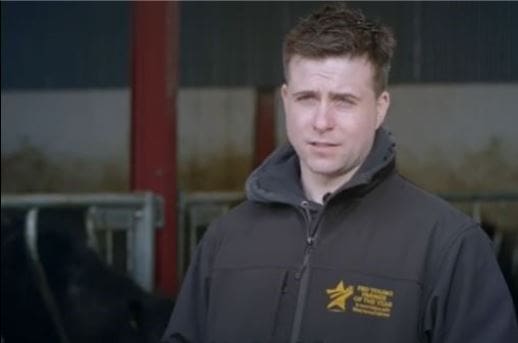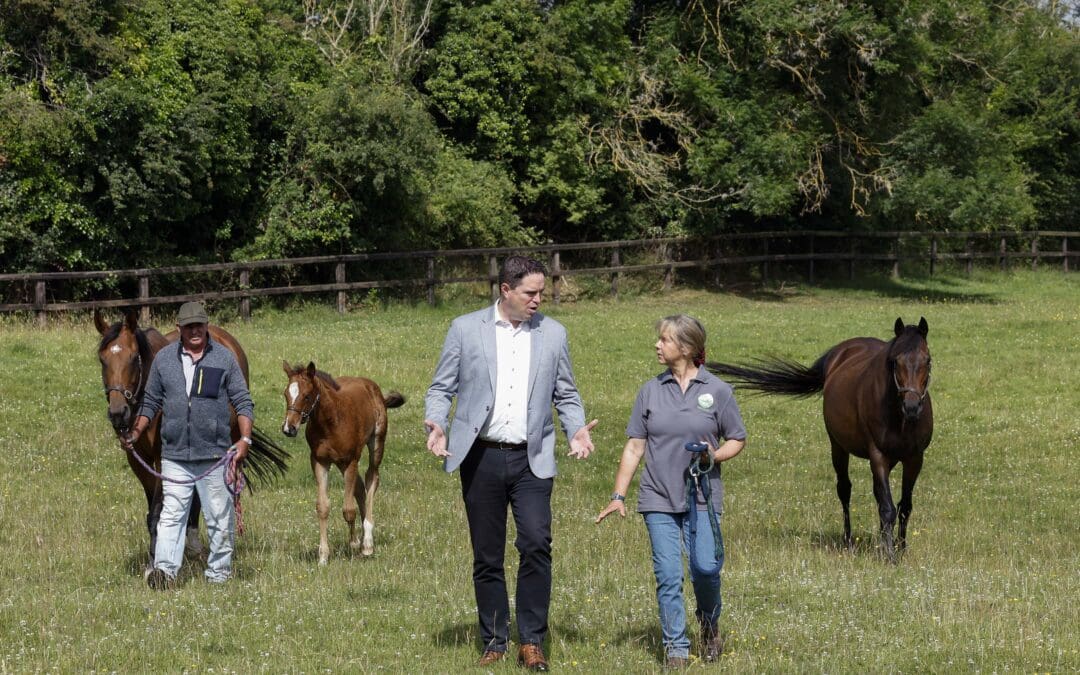A Visit to the Award-Winning Farm of Andrew McMenamin: Championing Biodiversity and Carbon Reduction in Rural Ireland”
In the picturesque village of Ballybun, nestled in the heart of Castlefinn, County Donegal, lies the 30-acre family farm of Andrew McMenamin, the proud recipient of the 2022 National Rural Network Biodiversity Young Farmer of the Year award. McMenamin, a graduate of GMIT with a degree in Agricultural Science, has transformed his family’s farm into a shining example of sustainable agriculture, demonstrating that carbon reduction targets and increased biodiversity can thrive even in more intensive farming systems.
A Journey of Transformation: From Australia to Donegal
Andrew’s journey to becoming an environmental steward began in 2012 when he graduated from GMIT. After briefly venturing to Australia, a rite of passage nowadays for our young graduates, he returned to his roots in 2015 to take over the reins of the family farm. Initially operating a store-to-beef enterprise, he later transitioned to a dairy calf-to-beef operation.
Balancing Act: Biodiversity and Carbon Reduction
At the heart of his enterprise is the rearing of 30 calves per year to beef. The stock density on the grazing platform is maintained at 2.5 livestock units per hectare, with the remaining land dedicated to silage production. McMenamin’s aim is to fatten the calves to between 18 to 22 months while minimising the use of concentrate feed, a goal impressively achieved with less than a tonne of concentrate per animal over its lifetime.
Grassland Management and Biodiversity Excellence
McMenamin’s success is built upon a foundation of excellent grassland management and high-quality silage production. His commitment to biodiversity is evident in his farm’s exceptional hedgerow management, a passion that traces back to his 2012 dissertation at GMIT. Gaps in the hedges are planted with native species, enhancing the farm’s value to native wildlife, particularly bees and other invertebrates.
During the COVID-19 lockdown, McMenamin introduced beehives on the farm, reinforcing his commitment to supporting local ecosystems. Now, when planting trees in the hedgerows, he carefully considers the potential benefits for bees and other wildlife.
Soil Fertility and Environmental Responsibility
Soil fertility is another key focus of McMenamin’s efforts. He emphasises the importance of spreading fertilizers and liming at the right time and under the right weather conditions, always considering the specific needs of the soil. This thoughtful approach prevents over-saturation, maintains grass performance, and prevents leaching into local watercourses.
Pioneering Sustainable Practices
In line with his dedication to environmental sustainability, McMenamin incorporates protected urea, a practice that, according to research, reduces a farmer’s emissions by 8%. Protected urea is a specialised agricultural fertilizer designed to release nitrogen slowly and efficiently into the soil, addressing the issue of rapid nitrogen loss through volatilisation, which can contribute to environmental problems like air pollution and greenhouse gas emissions. To prevent these losses, protected urea is coated or treated with substances such as sulphur, polymer coatings, or inhibitors, regulating nitrogen release and extending its availability to plants over time, reducing the risk of ammonia gas escaping into the atmosphere. This approach enhances nitrogen use efficiency for farmers, curbs nitrogen losses to the environment, and supports more sustainable agricultural practices by providing consistent nitrogen supply to crops while minimising negative environmental impacts associated with nitrogen fertilizers.
He has also introduced multi-species swards and red clover swards on the farm, reducing nitrogen usage and extending the grazing season. These swards not only enrich the soil but also bolster local biodiversity. The red clover in particular acts as a great boost to the crop of local pollinators.
A Vision for the Future
For Andrew, the environment is intertwined with every aspect of farming in Ireland. He believes that farmers are the custodians of the land and bear the responsibility of passing on a healthy, biodiverse landscape to future generations.
With Ireland aiming for a 25% reduction in emissions by 2030, Andrew acknowledges the ambitious target but emphasises its necessity, especially for intensive farming practices. He highlights the importance of financial incentives to ensure that sustainable actions are carried out and targets are met. Farmers can have the best of intentions and all the ambition and drive in the world, but positive actions are often inhibited by the cost factor they incur.
As a young farmer, Andrew recognises that the decisions made today will have a lasting and direct impact on the landscape for the next 10 to 15 years. Habitat loss is a pressing issue, and farmers play a pivotal role in both reducing harmful practices and rectifying past damage. Through initiatives such as planting hedgerows and diversifying crops, he believes that the agricultural sector can significantly reduce emissions, paving the way for a greener and more sustainable future.
Empowering the Future: A Call to Action
Andrew’s commitment to the environment extends beyond his own farm. He is well aware that the urgency of environmental stewardship transcends local boundaries and impacts global events. From the nightly news to conversations in local shops, the environment has become a central topic of discussion, and Andrew is at the forefront of this vital conversation.
In a world where climate change is a looming threat, Andrew sees himself and fellow farmers as pivotal players in safeguarding the planet. Farmers, he believes, have the unique responsibility of reversing habitat loss and reducing the detrimental effects of agriculture on the environment. By prioritising actions like planting diverse hedgerows and adopting multi-species swards, emissions from the agricultural sector can be significantly curtailed. These actions alone will not achieve the end goal, but as steps to positively affect the environment are unrivalled in the history of farming.
Championing Sustainability for All
As Ireland and the world grapple with the challenges of environmental sustainability, Andrew underscores the importance of financially rewarding sustainable practices. He firmly believes that the environmental schemes of today must provide tangible economic incentives to ensure widespread adoption among farmers. This, he argues, is critical for achieving the ambitious targets set for reducing emissions.
Being a young farmer, he is acutely aware of the long-reaching consequences of the choices made today. The decisions and actions taken now will ripple through the farming community and the broader ecosystem for the next decade and beyond. Andrew encourages fellow farmers to embrace their role as stewards of the land and to collectively work towards a healthier, more biodiverse landscape.
In Conclusion: A Beacon of Hope in Agriculture
Andrew McMenamin’s farm stands as a testament to the transformative power of sustainable agriculture. Through careful management, innovative practices, and a deep commitment to biodiversity and carbon reduction, he has proven that intensive farming can coexist harmoniously with the environment.
As Ireland strives to meet its ambitious emissions reduction targets, Andrew’s story serves as an inspiration to farmers and environmentalists alike. With dedication, innovation, and a shared sense of responsibility, there is hope for a future where agriculture and nature thrive hand in hand, preserving the planet for generations to come.
VIEW our YouTube Video on our farming Champion – Biodiversity Young Farmer of the Year 2022, Andrew McMeniman




